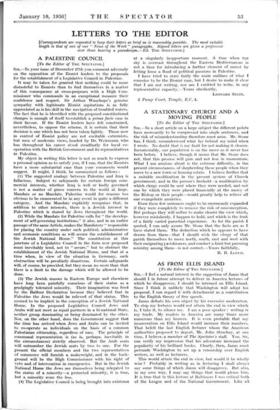A PALESTINE COUNCIL
LETTERS TO THE EDITOR
[Correspondents are requested to keep their letters as brief as is reasonably possible. The most suitable length is that of one of our "News of the Week" paragraphs. Signed letters are given a preference over those bearing a pseudonym—Ed. THE SPECTATOR.] [To the Editor of THE SPECTATOR.]
Sri,—In your issue of December 27th you comment adversely on the opposition of the Zionist leaders to the proposals for the establishment of a Legislative Council in Palestine.
It may be taken for granted that nothing could be more distasteful to Zionists than to find themselves in a matter of this consequence at cross-purposes with a High Com- missioner who commands in an exceptional measure their confidence and respect. Sir Arthur Wauchope's genuine sympathy with legitimate Zionist aspirations is as fully appreciated as is his skill in the navigation of troubled waters. The fact that he is identified with the proposed constitutional changes is enough of itself to establish a prima fade case in their favour. If the Zionist leaders have felt constrained, nevertheless, to oppose the scheme, it is certain that their decision is one which has not been taken lightly. Those now in control of Zionist policy are not excitable extremists, but men of moderate views, headed by Dr. Weizmann, who has throughout his career stood steadfastly for loyal co- operation with the British Government and its representatives in Palestine.
My object in writing this letter is not so much to express a personal opinion as to satisfy you, if I can, that the Zionists have a more substantial case than your comments would suggest. It might, I think, be summarised as follows : (1) The suggested analogy between Palestine and Iraq is fallacious. Subject to safeguards for certain foreign com- mercial interests, whether Iraq is well or badly governed is not a matter of grave concern to the world at large. Mandate or no Mandate, Palestine would for reasons too obvious to be enumerated be in any event in quite a different category. And the Mandate explicitly recognises that, in addition to other interests, there is a Jewish interest in Palestine which is shared by Jews throughout the world.
(2) While the Mandate for Palestine calls for " the develop- ment of self-governing institutions," it also, and in an earlier passage of the same Article, makes the Mandatory " responsible for placing the country under such political, administrative and economic conditions as will secure the establishment of the Jewish National Home." The constitution at this juncture of a Legislative Council in the form now proposed must inevitably tend, not to " secure," but to obstruct the establishment of the Jewish National Home, and that at a time when, in view of the situation in Germany, such obstruction will be peculiarly disastrous. Certain safeguards will, of course, be provided, •but they mean no more than that there is a• limit to the damage which will be allowed to be done.
(3) The Jewish masses in Eastern Europe and elsewhere have long been painfully conscious of their status as a grudgingly tolerated minority. Their imagination was fired by the Balfour Declaration because they believed that in Palestine the Jews would be relieved of that status. This seemed to be implicit in the conception of a Jewish National Home. In the proposed Legislative Council Jews and Arabs will not meet as equal partners in a bi-national State, neither group dominating or being dominated by the other. Nor, on the other hand, does the Government suggest that the time has arrived when Jews and Arabs can be invited to co-operate as individuals on the basis of a common Palestinian -citizenship, regardless of race. The principle of communal representation is (as is, perhaps, inevitable in the circumstances) strictly observed. But the Arab seats will outnumber the Jewish seats by two to one. For the present the official members and the two representatives of commerce will furnish a makeweight, and in the back- ground will be the High Commissioner with his right of veto and of intervention in emergencies. But in the Jewish National Home the Jews see themselves being relegated to the status of a minority—a protected minority, it is true, but a minority none the less.
(4) The Legislative Council is being brought into existence
at a singularly inopportune moment. A time when tne sky is overcast throughout the Eastern Mediterranean is not a time for introducing a further element of unrest by letting loose a flood of political passions in Palestine.
I have tried to state fairly the main outlines of what I conceive to be the Zionist case, but I desire to make it clear that I am not writing, nor am I entitled to write, in any representative capacity.—Yours obediently, 2 Pump Court, Temple, E.C. 4.
LEONARD STEIN.










































 Previous page
Previous page